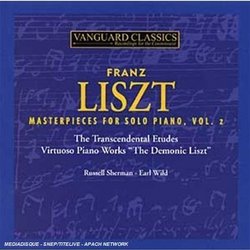| All Artists: Franz Liszt, Russell Sherman, Earl Wild Title: Liszt: Masterpieces for Solo Piano, Vol. 2 Members Wishing: 1 Total Copies: 0 Label: Vanguard Classics Release Date: 4/27/2004 Genre: Classical Styles: Ballets & Dances, Polkas, Chamber Music, Historical Periods, Classical (c.1770-1830), Modern, 20th, & 21st Century Number of Discs: 2 SwapaCD Credits: 2 UPC: 699675148829 |
Search - Franz Liszt, Russell Sherman, Earl Wild :: Liszt: Masterpieces for Solo Piano, Vol. 2
 | Franz Liszt, Russell Sherman, Earl Wild Liszt: Masterpieces for Solo Piano, Vol. 2 Genre: Classical
|
Larger Image |
CD Details |
CD ReviewsPianism of first order! Hiram Gomez Pardo | Valencia, Venezuela | 04/05/2006 (5 out of 5 stars) "Having bought this album on the old vinyl format in the middle seventies, I found it very pleasant to listen, because as all we know, Earl Wild is much more than a simple virtuous keyboard player. His musical thoughts may be felt in every single track. On the other hand Earl Wild and Michael Ponti are at this moment the only survivors of the last Romantic School and that means we are in front the last exponents of a musical tradition. In the case of Russell Scherman I find him a very solvent piano player. His [...] is clean and precise and he possesses that required technique to shine with those hard to play piano works. So take this statement into account when you decide to bet for this golden CD, because the final result is even better than the sum of the parts. Absolutely recommended. " Excellent Dean Brown | Princeton, NJ USA | 02/09/2008 (5 out of 5 stars) "I bought this CD set for the second disk - Earl Wild's Demonic Liszt, which I could not find seperately. The Demonic is astonishing in every way, and will only satisfy. Don Juan has never been played like this, IMHO. The other disk is Russel Sherman's Transcendental Etudes. Now, though my favorite version of this set is Claudio Arrau's, Mr Sherman's rendition is this: If you ever wanted to slow down a piece of piano music and actually hear all the fine detail, this is the version for you! And although it's very very slow, there is a magnificent touch, making this a most enjoyable set. If ever you wanted to learn a piece and need to hear it in slow motion, try this for size! 5 stars. -Dean" Earl Wild's "The Demonic Liszt" is a must-have, but... SwissDave | Switzerland | 12/30/2007 (4 out of 5 stars) "The reason, I'll admit it, I bought this set was because I finally wanted a copy of Earl Wild's "The Demonic Liszt", one of the handful greatest Liszt discs, and by far one of Earl Wild's finest overall (whoever finds him mechanically fleet if not interpretatively superficial at times needs to hear this - virtuosic and music-making at its best). The 1968 sound quality needs no excuse: this might pass for an audiophile recording (which, ironically, it was not universally considered to be back when it was first marketed).
Russell Sherman's recording of the 12 Transcendental Studies was new to me, and now that I have listened to it for a number of times, I can say without malice that he does pull about (and apart) most of the faster sections and does best in the slower ones ("Paysage", "Recordanza" and "Harmonies du Soir" are quite memorable, if also mannered and stretched in places, when it's Sherman's ruminative bass notes rather than a stop-and-go sense of rhythm that form the glue that keeps it all from falling to pieces), and willfully so, since there can be no doubt that technically, he can do whatever he likes on the keyboard. But, and it's a big BUT: inventiveness or an intended contrary of boredom is NOT the equal of manipulation! Such outlandishness may be fun in the concert hall (and believe me, I would be ever so glad to hear some idiosyncracy at piano recitals rather than the polished risk-aversion we seem to get too much of nowadays), but it wears off all too quickly on disc, and becomes tiring with repeated listening. The 1974 sound quality is a bit close, drier and more variable, but perfectly acceptable. For a benchmark complete version of the Transcendental Studies, Claudio Arrau's remains a safe bet, and of course there are countless great recordings of (almost) all of the individual pieces out there. In a nutshell: I'm not sure Vanguard does the customer a service by "forcing" us to buy an interesting, but at the very least controversial recording along with a justly famous one, but then, one gets two for the price of one, so perhaps one shouldn't complain after all. In fact, Wild's "Reminiscences de Robert le Diable" alone would be worth the price of this set (don't know a better "Gnomenreigen" or "Mephisto Polka" either, and Wild's "Mephisto Waltz" - not the same as the 1967 Reader's Digest one, by the way, prefer this one - and "Reminiscences de Don Juan" are among the finest and, since not in historical/archival but full-bodied sound, best-recorded on disc). Greetings from Switzerland, David." |

 Track Listings (12) - Disc #1
Track Listings (12) - Disc #1